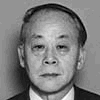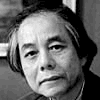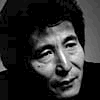 |
|
 |
 |

 |
 |
 |
High Expectations for Sweet Degeneration
by Kyushiro KUSAKABE(Film Critic / '97 Festival Advisor)
|
 |
The second NHK Asian Film Festival has finally opened. Knowing the obstacles that had to be overcome, I am eager to see how the four new films have turned out. This project to discover new Asian talent and to create new Asian films has created quite a stir in film circles in various Asian countries. And now it's the second festival, time to sit back and savor the four eagerly awaited new films from Malaysia, Sri Lanka, Uzbekistan, and Taiwan.
Although the four films are all "Asian," each masterfully brings out the flavor of the country it represents. Of the four, I am especially excited about Sweet Degeneration. In the past few years of the Asian film renaissance, the Chinese-language output has been striking, and the films produced in Taiwan recently have been particularly notable. At this year's Tokyo International Film Festival, the works of leaders of the new generation of Taiwanese filmmakers (Chen Yu-hsun, and K'o I-cheng) were front-and-center in two competition categories (Young Cinema and International) and the Cinema Prism division.
Sweet Degeneration is Lin Cheng-sheng's first film since Murmur of Youth, and by examining the daily lives of ordinary people it represents a serious inquiry into the family and the struggles of humanity. The camerawork is so meticulous and intimate that you can almost feel the texture of human skin and the warmth of human breath. Lin is a rare talent, even among Asia's highly sensitive filmmakers. Having watched over this film's production process since the days of synopsis and scenario, I now have high hopes for the finished work.
(Mr. Kenichiro Kusakabe passed away in August 2001. Requiescat in Pace.)
|
 |
 |
 |
A Depiction of Noble Failure without Over-Valorization
by Taichi YAMADA(Script Writer / '97 Festival Advisor)
|
 |
Director U-Wei Bin HajiSaari's 1994 film, The Arsonist, makes an interesting comparison with his latest achievement. In The Arsonist, a one-time freedom fighter in Malaysia's independence struggle against Holland now finds himself working as a migrant laborer on gum plantations. He is depicted through the eyes of his son. To the other members of his family, the father is a domineering figure, a solitary man who has difficulty expressing his love and whose warped sense of pride makes him disdainful of speaking to the other laborers, though not to his boss.
Though this stubborn pride was what once allowed the man and others like him to win their national independence, now it is an impediment to daily life. His passion for justice degenerates into an insatiable and uncontrollable urge to commit arson. The man becomes the source of much anger, hatred, and grief for his son; but running through their turbulent relationship is a tenor of sympathy and pity on the part of the boy. It is in this regard that The Arsonist shares something with Jogho. The latter, however, is the more complex and compelling story.
Jogho tells of Mamat, a veteran bullfighter trainer whose profession has been outlawed, due not to Western-style modernization but rather Islamic fundamentalism. Mamat is forced to emigrate to Thailand; the director's depiction of the differences between the two countries was a revelation to me. Mamat is always protesting, "Bullfighting has been around as long as anyone can remember," a simple pronouncement masking a deep and abiding passion; a beautiful sentiment - and a doomed one.
U-Wei's brilliant use of detail to create excitement (such as the scene in which Mamat, having fired off a round from a cheap handgun, finds it too hot to hold on to), gradually builds to create a masterly portrait of noble failure, without lapsing into over-valorization.
|
 |
 |
 |
Deeply Touched by the Director's Thoughts
by Etsuko TAKANO(General Manager, Iwanami Hall / '97 Festival Advisor)
|
 |
I am utterly delighted that we are now inaugurating a 2nd Asian Film Festival '97, following the success of the first one in 1995. I have given these projects and their objectives my total support. Most importantly, we have provided production funds while respecting the freedom of the films' creators to determine content.
As a Festival Advisor this year, I was able to review the scenarios for the candidate films. However, one can never know whether a film will fulfill the potential of the script or not until after it has been made. The risk and danger this situation entails are what make movie-making such a thrilling enterprise. That all of the four 1995 films turned out to be of such a high standard was nothing short of a miracle.
I awaited the completion of "I WISH..." with a mixture of anticipation and trepidation. I have fond memories of the days I spent among the people of Uzbekistan at the Tashkent International Film Festival in 1982. For that reason, I could easily relate to his proposal for the '97 Festival.
Musakov cites as the most important ingredients of filmmaking the following elements: humor, lyricism, great acting performances, and an appealing storyline - one that all the peoples of the world can comprehend. I completely agree with him. And yet this intensely humanistic kind of film is gradually dying out around the world. Musakov is one of the few who perseveres in such an approach.
The "wish" of his film's warm-hearted principal character constitutes a kind of dream. Even though this found clear expression on the page, I had some concerns about how it would translate to the screen.
Having just watched a video of the completed "I WISH...", I feel completely relieved. Though the version I saw does not yet have Japanese subtitles, I can say that the thoughts the director had in mind when he made the film really struck home. This is a film that affirms a faith in humanity. I await with impatience the time when I can watch this again on the big screen together with all of you.
|
 |
 |
 |
The Rise of a New Generation of Asian Film Directors
by Tadao SATOH(Film Critic / '97 Festival Advisor)
|
 |
The 1st Asian Film Festival held the year before last was, naturally, well received in Japan. But the response from overseas was quite incredible.
To take just one example, Nostalgia for Countryland, by the Vietnamese director Dang Nhat Minh, gained screenings at over 50 film festivals around the world following its showing in Tokyo. It announced to the world the existence and high standard of the Vietnamese film industry. In some countries, the film was also aired on TV and shown in theaters. The fact that a Vietnamese film has attracted so many fans from all over the world who previously did not even know of the industry's existence in that country suggests we have entered a new era.
Man of the Story, by Indian director Adoor Gopalakrishnan, gained him the accolade of India's Best Filmmaker in 1996. Since India makes more films than any other country in the world, a talented director such as he is never short of work; but it naturally tends to be of the mass-entertainment variety rather than a search for truth or a work of art.
This film was shot locally in the state of Kerala and in the Malayalam language, under difficult conditions that would be only too familiar to the rest of the world's struggling independent filmmakers. That's why he was so delighted to obtain funding from NHK to make the film he wanted without any sort of artistic compromise. The result was a triumph.
When Mongolia shook off the fetters of socialism and embraced democracy, the resulting feeling of liberation helped the creativity of the Mongolian film industry blossom. One of the most notable works in this early period was Shackles, directed by Nansalyn Uranchimeg. Having caught the eye of NHK, she went on to make the NHK co-production Heaven's Animal. However, at that time the Mongolian film industry was already being knocked sideways by the country's dire economic conditions, and production was by no means easy. With this in mind, we can probably safely say that this work played an important role in signaling to the world that the flame of the revitalized Mongolian film industry was not going to be snuffed out.
Though still one of the liveliest parts of Asia in terms of movie production, Thailand is nonetheless making only a small fraction of the number of works that it churned out in its heyday. It is a cause for celebration that a rich, unpretentiously traditional work such as Cherd Songsri's House of the Peacock (1995) could have been made.
Asia's films have really only begun to attract international attention in the past ten years or so. More specifically, the process began in the mid-1980s. Before then, except for a certain portion of Japanese and Indian output, Asian films were practically unknown. Now, however, no matter which international film festival one attends, films from every part of Asia are wildly popular. You could be forgiven for thinking that there was a sudden efflorescence of Asian film in the 1980s, but in fact this was not the case. In the same way as the 1950s was the golden age of film production in Japan, throughout most of the 1960s and 1970s, over large swaths of the region, both movie theaters and the industry's coffers were overflowing. It's just that foreigners made no attempt to find out about what was happening. In the Sixties, the spread of television was the beginning of the decline for the Japanese film industry. The same process happened in much of the rest of Asia, with a ten to twenty-year time lag. The growth of TV and video simply shrank movie production. In other words, the relatively newfound international popularity of Asian films has coincided with something of a crisis for the industry.
Since Asian films in general have become the focus of so much international attention, the rise to prominence of a clutch of new directors with huge talent has been remarkable. Yet, because they are operating within a general state of industry crisis, these filmmakers are being forced into a long hard fight to boost their influence. This is not that much different from the situation their Japanese counterparts face currently. Conditions differ between countries, but having finally won worldwide scrutiny for their creations, many of the stream of passionate new directors now appearing throughout the region with works of international appeal are finding themselves in a harsh environment.
As an unreserved embrace of the self-expression and self-assertion of all the peoples of Asia, this Asian Film Festival is an attempt to enrich the whole of our culture of the moving image. At the same time, however, it would be wonderful if the popular enthusiasm it generates could act as a modest, yet totally sincere support for all those Asian filmmakers who are being hampered from expressing themselves as they wish by the severity of the current situation.
Like Mongolia, Uzbekistan is now also in dire economic straits following the collapse of communism. There, too, the existence of the film industry is under threat. Elsewhere, Sri Lanka has a long tradition of making films that reverberate internally with rich, emotional expression; but due to its small population and meager economy, the challenge of maintaining this tradition is fraught with difficulties. Malaysia has at least reached the stage of rapid economic growth. Yet its population is not that large. Further, it is made up mainly of Malay and Chinese, who tend to keep their cultural distance from their fellow Indian citizens. Split along racial lines, the local film industry is hindered from growing much further. In Taiwan, the artistic success of their films makes them world trendsetters. However, with the spread of TV and video and the popularity of American movies there, the reality is that film output there has shrunk to barely one-tenth of what it was in its heyday.
Despite all this, I think that all the visitors to the 2nd Asian Film Festival will be able to confirm my point that, in each country in Asia, a passionate new generation is coming to the fore to liven up the directorial scene. We have the humor of Uzbekistan's Zulfikar Musakov, the sorrow of Sri Lanka's Prasanna Vithanage, the anger of Malaysia's U-Wei Bin HajiSaari, and the subtlety of Taiwan's Lin Cheng-sheng. Their art is vital and fresh and we should welcome it wholeheartedly.
|
 |
 |
 |
Cognitive Dissonance
by Kohei OGIRI(Film Director / '97 Festival Advisor)
|
 |
The first Sri Lankan film I ever saw was Village in the Jungle directed by Lester James Peries. This was about 15 years ago. I was drawn strongly to this film by its stark portrayals of its characters. One could trace the very roots of their humanity.
Death on a Full Moon Day, by director Prasanna Vithanage, possesses this same quality. It has gravitas, solemnity. As in Peries's film, the main character persistently defers important decisions. An old blind man, he refuses to believe that his son has been killed in the civil war. Yet it is easy to misunderstand this "blindness." Occasionally the misfortunes brought upon us by history and society are beyond the limits of our endurance. It is at this point that something of a "time lag" opens up. But this does not mean simply taking time to come to grips with a difficult situation. Rather, it is a type of cognitive dissonance in which experience and self will never be brought into alignment. This is one expression of human nature.
In Dark Night of the Soul, another film directed by Vithanage, the principal character fails to take any of several opportunities to turn over a new leaf, and continues to "lag" right up to the eleventh hour. Again, in Walls Within, we have a man who, incapable of making a decision, goes off to sea for a full 25 years before he returns to his woman. One might well think of this as the most stupid irresoluteness.
However, none of these films is a psychological drama as such. There is no fixed standpoint from which to view or judge a character's development. Instead, it as if the maker of the film were himself wavering between different conceptions of "who I am." One must seek out the meaning of the film within this indeterminacy. And that, I like.
This is what I end up thinking when I watch one of these superb Asian films. I do not see this sort of wavering character as dull-witted, nor do I regard the director's creative talent as dim. Accustomed as our eyes have grown to watching movies, we tend to demand that characters make quick decisions and take quick action. But the power of a film to transfix us lies elsewhere. Director Vithanage understands this point very well.
|
|





